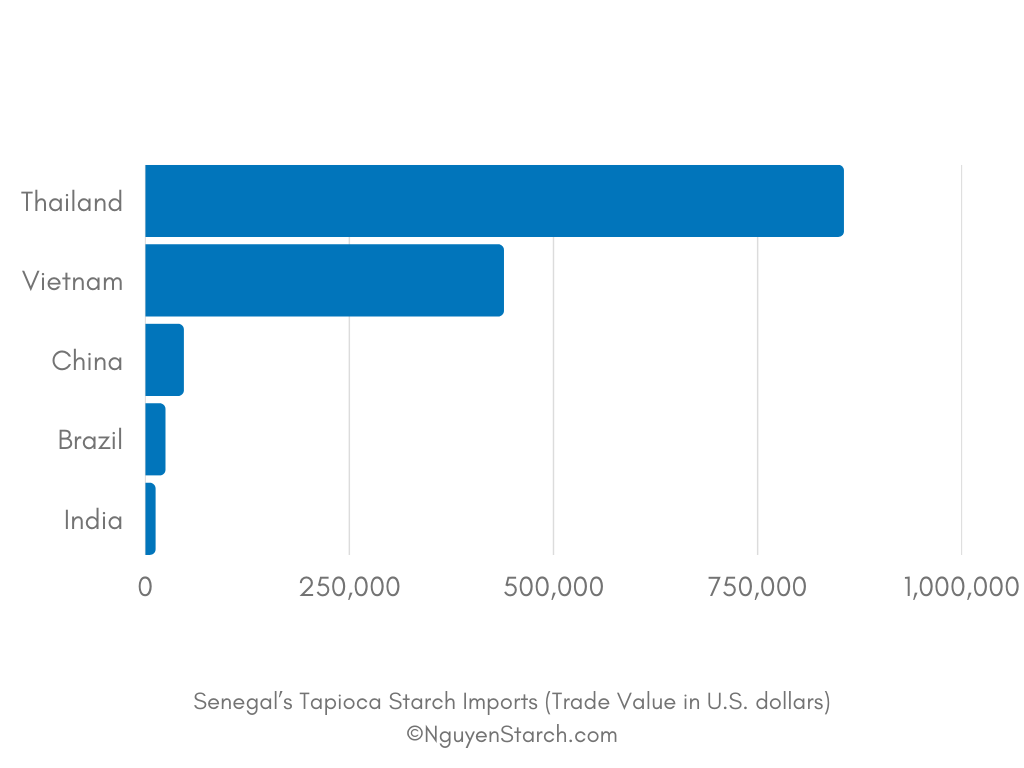Senegal’s involvement in the tapioca starch trade showcases both export success and a robust demand for imports. The country’s export performance, with Belgium and France as key destinations, demonstrates its potential for growth and market expansion. Simultaneously, Senegal’s reliance on imports from Thailand, Vietnam, China, Brazil, and India underscores the importance of these countries in meeting domestic demand.

Exports
Senegal’s presence in the global tapioca starch market has seen steady growth. In 2021, the country exported a total of $509 worth of tapioca starch, positioning itself as the 90th largest exporter of this versatile product worldwide. While tapioca starch ranked as the 2032nd most exported product in Senegal that year, its export performance demonstrates potential for further expansion and market penetration.
Belgium and France emerged as the primary destinations for Senegal’s tapioca starch exports. Belgium accounted for the majority of these exports, contributing $293, while France followed closely with $216. These figures underscore the significance of European markets and indicate a growing demand for Senegal’s tapioca starch in these regions.
Among Senegal’s export markets, Belgium and France experienced the fastest growth between the previous period and 2021. Belgium witnessed an impressive surge of $293, with France contributing an additional $216. These developments highlight the increasing recognition and demand for Senegal’s tapioca starch in these markets.
| Continent | Country | Trade Value (2021) |
| Europe | Belgium | 293 |
| Europe | France | 216 |
Imports
Senegal’s import figures for tapioca starch in 2021 reflect a substantial demand for the product. With imports totaling $1.38M, the country secured its position as the 39th largest global importer of tapioca starch. While tapioca starch ranked as the 988th most imported product in Senegal during the same year, the import data indicates a strong reliance on foreign suppliers to fulfill domestic demand.
Thailand emerged as the leading source for Senegal’s tapioca starch imports, with a total value of $855k. Vietnam followed closely behind with $439k, while China contributed $46.5k. Additionally, Senegal imported tapioca starch from Brazil ($24k) and India ($11.9k). These countries played a vital role in meeting Senegal’s growing tapioca starch requirements.
The period between 2020 and 2021 witnessed significant growth in Senegal’s import markets for tapioca starch. Notably, Thailand experienced a substantial surge with an increase of $369k, followed by Vietnam with $311k, and Brazil with $24k. These figures highlight the evolving dynamics of Senegal’s import market and emphasize the importance of these countries as key suppliers.
| Continent | Country | Trade Value (2021) |
| Asia | China | 46,532 |
| Asia | India | 11,893 |
| Asia | Thailand | 854,858 |
| Asia | Vietnam | 438,500 |
| South America | Brazil | 24,000 |
| South America | Venezuela | 6,245 |
Importing Tapioca Starch from Vietnam: A Reliable Partnership
Vietnam has emerged as a prominent supplier of tapioca starch to the Senegal market. In 2021, the total value of tapioca starch imports from Vietnam amounted to an impressive $438,500. This significant figure indicates that Vietnam’s tapioca starch holds a strong position in the market and is poised to maintain its presence in Senegal in the years to come. The reasons behind this sustained importation are primarily attributed to the product’s superior quality and competitive pricing.
Senegal benefits from Vietnam’s tapioca starch exports, which provide a dependable supply of this vital ingredient. The substantial import value from Vietnam underscores Senegal’s confidence in Vietnam as a trusted and preferred partner for fulfilling its tapioca starch requirements. With its consistent quality and competitive pricing, Vietnam’s tapioca starch has proven to be a reliable source that meets Senegal’s demand for this essential product.
Tariffs
In 2018, Senegal faced an average tariff rate of 9.46% on tapioca starch imports. Notably, several countries imposed high import tariffs on this product, including Angola, Burundi, Botswana, the Central African Republic, and Cameroon. These nations maintained a Most Favored Nation duty rate treatment, resulting in a significant 10% tariff on tapioca starch imports.
The presence of high import tariffs in these countries presents trade barriers and cost implications for Senegal’s tapioca starch imports. Policymakers and stakeholders must consider these tariffs when formulating import strategies and engaging in trade negotiations to ensure a balanced and sustainable market for tapioca starch.
Source: BACI and General Statistics Office of Vietnam
